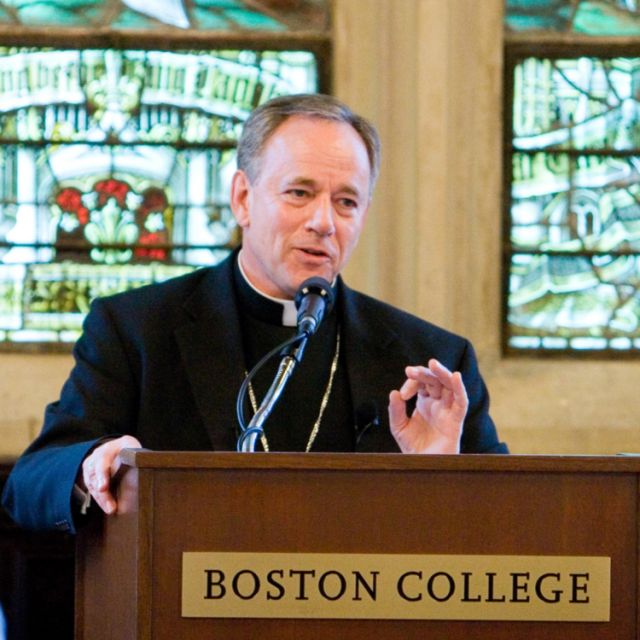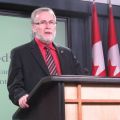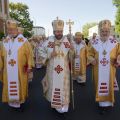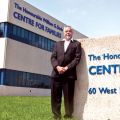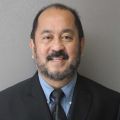This article was amended on Sept. 24, 2012 to clarify comments made by Jim Hughes.
OTTAWA - A statement by Vancouver Archbishop Michael Miller that supports Catholics who campaign for “gestational legislation” to limit abortion has helped calm growing tensions within the pro-life movement.
Miller wrote it is “morally licit” for Catholics to support legislation that sets limits on abortion rather than immediately banning it outright. The archbishop’s statement, quickly endorsed by Toronto’s Cardinal Thomas Collins and posted on the Canadian Conference of Catholic Bishops’ (CCCB) web site, urges co-operation in the pro-life movement but stresses: “Co-operation does not always mean unanimity regarding a given strategy; open and civil debate about the wisdom of any specific strategy is healthy.”
Over the past year, support in pro-life circles across Canada has grown for a law that would prohibit abortion at later stages of pregnancy or gestation. Campaign Life Coalition, the national political arm of the movement, however, has remained staunchly opposed as have several other groups that believe incremental legislation of this type will not result in an eventual ban on abortion.
Each side has accused the other of not being Christian or Catholic enough — either for not protecting those babies that might be saved through some restrictions on abortion, or for not sending a strong enough message about the value of all human life from conception.
But Miller said that both positions, for or against gestational legislation, are morally licit.
Miller wrote it is acceptable to support gestational legislation (i.e. legislation that would allow abortion in the early weeks of the unborn child’s development) as an incremental step that would reduce the harms of “an unjust legal regime that permits abortion.” But such law should be regarded “as a step along the way to the eventual full legal protection of the right to life of all unborn human beings.”
“At the same time, it is also morally licit to withhold support for gestational legislation — and other incrementalist legislative strategies intended to limit access to abortion — if, after prudent reflection, one is convinced that it is an unwise legislative strategy,” he said.
The Catholic Organization for Life and Family (COLF), co-sponsored by the CCCB and the Supreme Council of the Knights of Columbus, welcomed Miller’s intervention.
“The division within the pro-life movement is very preoccupying, especially when leaders and members of pro-life groups point at each other and criticize each other’s approach to protecting the unborn,” said COLF director Michele Boulva. “All this hinders our chances of obtaining a law that would protect the most vulnerable of Canadians — its unborn citizens.”
She applauded the bishops’ taking leadership in the pro-life arena.
“As Catholics it is essential that we turn to our bishops when confusion arises regarding the Church’s teaching. Christ has empowered them to teach in His name.”
Based on Blessed John Paul II’s teachings in Evangelium Vitae, “legislation which intends to limit the harm done by a pro-abortion law is not itself co-operation with unjust law but rather ‘a legitimate and proper attempt to limit its evil aspects,’ ” the archbishop wrote.
The absence of any law restricting abortion in Canada is a “de facto legal regime that permits abortion with almost no restrictions,” the archbishop said.
“Legislation intended to restrict access to abortion would not create a new legal situation in Canada which would authorize abortions, but instead would intend to limit the number of abortions already authorized under law,” he said.
He also reiterated Catholic teaching against abortion at any stage, noting that “no law can claim to legitimize abortion.”
Two major pro-life groups on either side of the issue welcomed Miller’s statement.
Campaign Life president Jim Hughes said the archbishop makes it clear we have a de facto law by having no restrictions on abortion.
“I thought Archbishop Miller laid the case pretty well,” he said. "Although I and many others would not necessarily agree with his opinion on a de facto law.”
The most important part of his statement “points out that gestational legislation may or may not be the way to go,” said Hughes, who remains wary of the gestational legislation approach.
Priests for Life Canada is among the many pro-life groups that would support gestational legislation. Priests for Life board chairman Fr. John Lemire, a parish priest based in New Liskeard, Ont., said he is pleased the archbishop’s statement has “supported the idea that a Catholic, a Catholic politician, can in good conscience support gestational legislation.”
The archbishop’s letter may have helped shore up some of the unity within the pro-life movement that has been fragile since its inception, Hughes said. The movement is made up of political, educational and pastoral groups that counsel and support mothers with unexpected pregnancies.
“Campaign Life Coalition has been accused of being ‘all or nothing’ and that’s not true,” Lemire said, noting that since its first questionnaire in 1978, it has “always had an incremental question as part of its strategy.”
The key, said Hughes, is in the wording of any legislation.
“I’m not in favour of ‘we need any law,’ ” Hughes said.
He is opposed to the gestational approach because the experience of countries with gestational laws in place have “so many exceptions” the laws are “virtually useless.” There are many other forms of incremental legislation that would restrict abortion — such as defunding it, or informed consent laws, that Campaign Life would support, he said.
“As the political branch of the pro-life movement we have been battling over 30 years,” he said. Campaign Life has also worked closely with counterparts in other countries who have said “gestational limits are not the way to go.”
Hughes’ objection to gestational legislation extends beyond doctrinal concerns to practical matters, he said. Campaign Life has focused on identifying and supporting individual pro-life candidates in both the Conservative and Liberal parties at the grassroots level. He noted that there are presently 60 pro-life MPs in Parliament. A gestational bill would not have the votes to pass, he said. In addition, Prime Minister Steven Harper remains unwilling to reopen the abortion debate.
Hughes said momentum on the issue has been shifting towards the pro-life movement, but a focus on gestational legislation risks sidetracking it.
The role of the Priests for Life, Lemire said, is to work with all the groups, to “try to be a bridge builder and bring about some dialogue and conversations” not only among groups but with bishops and people in dioceses.
That does not mean Priests for Life agrees with every tactic, he said. But he stressed people who might not be comfortable in an activist role could be great counselling a young expectant mother, or doing any number of tasks that need to be done to create a culture of life.
Canadian bishops throw support behind Motion 312
By Deborah Gyapong, Canadian Catholic NewsOTTAWA - The Canadian Conference of Catholic Bishops (CCCB) issued a Sept. 18 statement affirming support for the sacredness of all human life from conception to natural end as Motion 312 comes to its second and final hour of debate in the House of Commons.
Conservative MP Stephen Woodworth's private member's motion would review the Criminal Code's definition of a human being in the homicide section that declares: "a child becomes a human being within the meaning of this Act when it has completely proceeded, in a living state, from the body of its mother."
The statement was signed by CCCB President Archbishop Richard Smith. It is posted on the CCCB web site (www.cccb.ca) and provides a link to Motion 312's text.
"The Catholic Church holds that a human being comes into existence at conception," Smith says in the statement. "The lives of human beings are, therefore, sacred at every stage in our existence — from beginning to natural end.
"As the House of Commons prepares to debate Motion 312, the bishops of Canada invite all members of the Parliament of Canada to take into full account the sacredness of the unborn child and each human life. We also encourage Canadian Catholics, and all people of good will, to pray that our legislators be blessed with wisdom and courage to do what is best to protect and further the common good, which is based on respect for the human dignity of all."
MP Woodworth makes final pitch on Motion 312
By Deborah Gyapong, Canadian Catholic NewsOTTAWA - Conservative MP Stephen Woodworth told journalists Sept. 17 his Motion 312 is not about abortion but whether Canada has lost its consensus on inalienable human rights and honest laws.
Woodworth admitted his private member’s motion has little chance of passing when it comes to a final vote Sept. 26 because the Prime Minister and chief government whip are on record that they will not support it because of promises they’ve made not to reopen the abortion debate.
On the opening day of the fall session of Parliament, Woodworth said Motion 312 “has much more important consequences than the abortion issue.” At stake is whether Canada has lost a consensus that the dignity and worth of every human being must be recognized, that rights are inalienable rather than granted by the government, that rights cannot be taken away through laws that deny basic human rights to a class of people by dehumanizing them and that laws must be honest, he said.
Motion 312 would strike a parliamentary committee to examine the 400-year-old definition of a human being in the Criminal Code’s homicide section concerning unborn children. For the purposes of the law, an unborn child is not a person with human rights until he or she leaves the birth canal. The committee would investigate whether this definition holds up in light of scientific evidence.
His motion specifically states the findings of the committee could not go against any Supreme Court of Canada decisions or the Constitution when it comes to women’s rights, he said.
Supreme Court Justice Bertha Wilson, who wrote the Morgentaler decision, was concerned about the rights of the unborn in later stages of pregnancy and left it open for Parliament to craft a law protecting them, and the courts have not closed the issue, he stressed.
Woodworth explained the motion, if passed, could undertake an investigation that may or may not settle the issue of when an unborn child is a human being.
“Even settling the issue of when a child should be a human being will not settle the issue of abortion,” he said.
Woodworth said one of the options of the committee could be to decide an unborn child is not a human being. His motion, however, is about universal human rights and he hoped the second hour of debate Sept. 21 would bring out that aspect.
Woodworth said he has been accused of “wanting to back to the Middle Ages,” or of opening issues that were settled by the courts. Opponents never talk about what his motion actually says, Woodworth said. No one has disagreed with the suggestion that unborn children might be human beings before birth.
“The first distraction is to talk about me, my character, my motives,” he said.
Tens of thousands of people have written their MPs in support of the motion, he said. And on Sept. 18, about 60 mainly religious and pro-life groups signed and sent a declaration in support of the motion to MPs. Among the 60 groups to sign “The Declaration of Support for Parliamentary Study of Canada’s Legal Definition of ‘Human Being’ ” were the Catholic Organization for Life and Family, the Knights of Columbus, REAL Women Canada, the Evangelical Fellowship of Canada and various evangelical churches.
After the news conference, journalists scrummed NDP Justice Critic Francoise Boivin who said the debate on abortion is closed. She pointed out Prime Minister Stephen Harper has taken the same view and Canadians have reached a consensus. The legal definition of a human being sees the pregnant woman as one person, not two, for the purposes of the law.
Surveys have consistently shown about two-thirds of Canadians would like some law restricting abortion.
Ukrainian Catholic bishops close synod with gala, challenges
By Catholic News ServiceWINNIPEG - Ukrainian Catholic bishops from four continents gathered for a final celebration Sept. 16 as they closed their weeklong Synod of Bishops.
One of their emphases was on the role of the laity, and the final "gala," as it was billed, included the Hoosli Ukrainian Male Chorus, an honour guard and the Selo Ukrainian Dancers.
Archbishop Sviatoslav Shevchuk of Kiev-Halych, the elected head of the Ukrainian Catholic Church, challenged his audience of 800 to live Christian life to the fullest and not as "lukewarm, nominal Christians."
"If we allow ourselves to be overcome so we don't pray or enter into liturgy, we will cease to be a Church," Shevchuk said. "We are called to be people of prayer, gasping for the air of the Holy Spirit.
"Sometimes our churches are more like Ukrainian museums. We need vibrant parishes, a place to encounter the living Christ. May our encounter today fill us with new faith, energy and perseverance."
Reinvigorating Ukrainian parishes is part of Vision 2020, the long-range pastoral plan for the Ukrainian Catholic Church, which was suppressed for decades under Soviet rule.
After an opening Divine Liturgy in Winnipeg Sept. 9, the 38 bishops in attendance moved to Portage La Prairie, a city of about 13,000 west of Winnipeg. Focusing on the theme "The Role of the Laity in the Life and Mission of the Church," they heard presentations and reports before breaking into smaller thematic groups.
A statement issued at the end of the synod said the bishops acknowledged the role of the laity in preserving the faith when the Church was suppressed in the 20th century, and they issued a pastoral letter to the laity; it was not immediately available in English.
"The laity must be collaborators with the bishops and priests in pastoral work and, with their giftedness and by their talents, contribute toward the building up of the body of Christ," the statement said.
The bishops proclaimed a patron of Ukrainian Catholic laity: Blessed Volodymyr Pryjma, a choir director from the parish of Stradch, Ukraine, who in 1941 was tortured and murdered by Soviet paramilitary agents in a forest after taking Communion to a sick woman with his priest.
They also pledged to support Ukrainians who have emigrated from their home country.
Bishop Borys Gudziak, newly named bishop for Ukrainian Catholics in France, Belgium, Netherlands, Luxembourg and Switzerland, told Catholic News Service before the synod began that in the last 18 years, Ukraine has lost up to 15 per cent of its population to emigration.
"People have been leaving in droves," he said, noting that, in many countries, the Ukrainians are illegal and living on the margins of society.
Gudziak was one of four bishops elected to the permanent synod for the next five years. Others were Archbishop Volodymyr Vijtyshyn Ivano-Frankivsk,
Ukraine; Bishop Ken Nowakowski of New Westminster, B.C.; and Bishop Jaroslav Pryriz of Sambir-Drohobych, Ukraine.
Next year's general Synod of Bishops will be Aug. 11-13 in Kiev, Ukraine, and will have as its theme the new evangelization.
Forgiveness can change the world as we know it
By Michael Swan, The Catholic RegisterTORONTO - Nobody disputes that forgiveness is the right thing to do, or that it might sometimes be difficult. Immaculée Ilibagiza has much more than that to say about forgiveness.
The Rwandan genocide survivor and best-selling author believes forgiveness can be the basis of our society — the foundation for a different kind of politics, a better sort of media, a more purposeful economy, higher ideals in education, stronger families and a new world order.
“It’s about understanding that forgiveness is peace. Peace starts in the heart. It starts in the family. It comes to the country,” Ilibagiza told The Catholic Register.
Ilibagiza will be at the Marylake Our Lady of Grace Shrine in King City, Ont., Sept. 28-29 to tell her story and nudge the audience into a deeper understanding of forgiveness.
Ilibagiza’s story of survival in the midst of the 1994 Rwandan genocide is as raw and inspiring as any. She and seven other women spent 91 days in silence hiding in a bathroom at the church rectory. She began those 91 days as a 52-kliogram (115-pound) 24-year-old surrounded by family everywhere she went. She emerged just 30 kilograms (65 pounds) as one of the last surviving Ilibagizas. Only one brother, who happened to be abroad during the orchestrated massacre of 900,000 Rwandan Tutsi and Hutus judged too friendly with Tutsi, survived.
In the cramped bathroom, Ilibagiza had a Bible, a dictionary and a rosary her father had given her. With the Bible and the dictionary she learned English. With the rosary she deepened her relationship with Mary.
Outside the church yard she confronted a man armed with a machete — the same man who killed her mother and a brother. She said to him, “I forgive you.”
In the aftermath of the genocide, Ilibagiza worked for the United Nations and eventually moved to New York to work at United Nations headquarters. She would quietly tell her story to co-workers and friends, but it wasn’t the sort of story that could stay quiet.
Eventually she wrote Left To Tell: Discovering God Amidst the Rwandan Holocaust. No ordinary venture into religious publishing, Left To Tell became a New York Times best seller, has been translated into 15 languages and has been added to the curriculum for thousands of high school and university students around the globe.
By now, Ilibagiza has told her story hundreds of times. DVDs of her retreat talks sell online and she’s signed a contract with MPower Pictures to transform her story into a feature film. But the 42-year-old mother of two continues to be surprised by the effect her story has on audiences.
“I’m really more amazed by what people take from my story,” she said. “What people take is that forgiveness, in such a magnificent way, is in their hearts.”
Ilibagiza has been confronted with many audience members who, either at the end of her talk or weeks later, discover a capacity to forgive husbands, wives, parents, children, brothers and sisters. But Ilibagiza also emphasizes how personal and intimate acts of forgiveness within families and among friends can begin a process that reaches beyond that immediate circle.
The touchstone of Ilibagiza’s talks is the spirituality of the rosary. She has written a book about the apparition of Our Lady of Kibeho, a recognized Marian apparition from the early 1980s in a small town in Rwanda. The apparition included a vision of men with machetes and a warning about the dire consequences of turning away from God.
The economic and social implications of reconciliation and forgiveness are on display to the world in Rwanda today, Ilibagiza said. The number of universities and university enrollment have skyrocketed since the genocide. The economy is growing at eight per cent yearly and Africa’s most densely populated and deeply divided nation is discovering a new sense of citizenship that transcends ethnic identity, she said.
“People are building now more than ever, because they learned a lesson,” said Ilibagiza. “My reason to forgive is that I finally came to understand that people can change, people can learn, people are smart.”
Ilibagiza has taken her gospel of forgiveness to the Vatican and an audience with Pope Benectict XVI. She met with the Pope at the end of his Angelus address Sept. 4. She found the experience overwhelming.
Tickets to Ilibagiza’s talk at Marylake are $50 for general admission or $100 for reserved seating, a reception with her and a signed copy of Left To Tell. Call (905) 833-5368 or visit www.luvn4gve.ca.
Bringing safety to troubled marriages
By Michael Swan, The Catholic RegisterBRAMPTON, ONT. - Catholic social workers in Brampton and Mississauga have found a new way to stand up for marriage by standing with as many allies as they can find.
Catholic Family Services Peel-Dufferin, a Catholic social work agency at the service of all families in the suburbs west of Toronto, is the lead agency for the Safe Centre of Peel, a family justice centre in the William G. Davis Centre for Families in Brampton.
“As Catholics, we can’t be afraid to lead,” said Mark Creedon, executive director of Peel-Dufferin Catholic Family Services.
Creedon has pulled together eight critical agencies that serve women and families faced with violence. Rather than being referred from one location to another to obtain housing, counselling, legal aid, medical advice, child care and more, at the Safe Centre it all happens in the same place. The idea is to deliver more effective and timely help and prevent women from giving up hope and returning to life with their abuser.
“Our purpose (at Catholic Family Services) is to preserve true marriages,” said Creedon. “If somebody goes into a marriage thinking his wife is his punching bag, well that’s not really a marriage.”
The Brampton Safe Centre isn’t the first Canadian family justice centre led by a Catholic agency. The former Catholic family services agency in Kitchener-Waterloo, now known as Mosaic, took the lead in establishing the Family Violence Project of Waterloo Region in 2006.
The idea of pooling and co-ordinating services to battered women in a single location started in San Diego, Calif., in 2002. Former City Attorney Casey Gwinn brought together police and social work agencies to form a united child abuse and domestic violence unit. To date, Gwinn’s National Family Justice Alliance has fostered and encouraged 80 family justice centres in the United States and 30 internationally from Amman, Jordan, to Sonora, Mexico.
“The fundamental issues are the same whether you’re in Canada, Mexico, Europe or anywhere else in the world,” Gwinn told The Catholic Register.
In the case of Canadian centres, having religious agencies lead the conglomerate of services is an advantage, he said.
“That spiritual care piece does make the Canadian model more vibrant. We struggle in the United States to get the spiritual care piece addressed in family justice centres,” he said.
Though it’s a Catholic agency that acts as landlord and instigator at the Safe Centre of Peel, the centre is able to connect clients with spiritual care for people of all faiths. The other agencies may not be Catholic, but they share values and a common purpose with Catholic Family Services, said Creedon.
“We’re dealing with excellent partner agencies that have great values which we share,” he said.
While Creedon has been able to get most of the critical services to buy in, he has struggled to get Peel Regional Police onside. The police are part of the Safe Centre’s steering committee and have worked out a protocol for getting victims from the Safe Centre to the police station. But they refuse to station officers already dedicated to domestic violence cases at the centre.
Peel Police claim their “best practice business model” involves working with the Safe Centre of Peel, but “does not involve the permanent stationing of officers within the facility,” Staff Sergeant Rob Higgs told The Catholic Register in an e-mail.
“It’s very shortsighted for law enforcement to say, ‘Oh, this isn’t really our thing,’ ” said Gwinn. “Law enforcement officers around the world are realizing they can’t do the job alone. They’re never going to arrest their way out of the problem.”
Peel Police responded to 2,042 criminal intimate relationship incidents in 2011 and another 6,554 verbal domestic occurrences. Overall, domestic calls in Peel have increased 13.99 per cent between 2008 and 2011, according to Higgs.
The more police come to the house and do no more than record the incident or negotiate temporary quiet, the more abusive men feel the law won’t touch them, said Gwinn.
“Empowered batterers are more likely to fight with police officers. Empowered batterers are more likely to kill police officers,” said Gwinn.
The repeat visits also cost taxpayers hundreds of thousands of dollars in police resources that don’t produce convictions, said Gwinn.
Creedon would like to persuade police to station officers at the Safe Centre, but for now hopes working effectively with police will convince the next chief to assign officers to the centre.
Getting this right is about much more than saving the police budget or getting more convictions. For Creedon, it’s about changing the direction for the next generation.
“One of the things we know about domestic violence is how much it is a generational thing,” he said. “So if you grow up in a family where your mother is getting abused — or it could be the father, but somebody is getting abused in that family — you are three times more likely to grow up to be an abuser or to be abused.”
Nationally the scale of the problem is immense. In 2007 there were more than 40,000 incidents of spousal violence reported to police, about 12 per cent of all police-reported violent crime in Canada, according to Statistics Canada. Women were the victims 83 per cent of the time.
“I totally believe there is something about being a Catholic family service agency that following the Catholic social justice values forces us to not walk away when we see tremendous injustice,” said Creedon.
Union support of political causes is under the gun
By Deborah Gyapong, Canadian Catholic NewsThe days may be numbered for union support of contentious political causes, something the Catholic Civil Rights League has been working towards for years.
While the league has been concerned about union support for same-sex marriage and other issues in opposition to Catholic teaching, the tipping point for political change may be the Public Service Alliance of Canada’s (PSAC) recent support for separatist candidates in the Sept. 4 Quebec election.
Conservative MP Pierre Poilievre, parliamentary secretary to the transport minister, promised to urge his cabinet colleagues bring in legislation that would allow employees to opt out of paying union dues.
“I cannot imagine how it could possibly be in the interests of a Canadian public servant for the union to back a separatist party,” Poilievre told the Globe and Mail. “And yet that is precisely what PSAC has done.”
The rights league became involved in the union dues issue back in 2004 when it fought for the rights of Catholic PSAC member Susan Comstock to have part of her $800 yearly mandatory dues diverted to charity because the union campaigned for same-sex marriage, contrary to her religious beliefs.
“We’ve always thought that, with good reason, union members should be able to put their request in writing so a portion of mandatory dues could be diverted to charity,” said league executive director Joanne McGarry. “The ability to opt out of the union is another possibility.”
At issue is “the ability of union members to have a say in how their money is spent so they don’t have to fund something they find morally repugnant,” she said.
Industry Canada employee Dave MacDonald, a former PSAC local president who represented Comstock in her grievance process, said the changes Poilievre proposes are “important because the PSAC, among others, have ceased to be an organization focused on improving workers’ rights and become a political organization.”
“As a Catholic, I am offended that my union dues are used to fund court challenges on abortion and same-sex marriage, gay pride parades and similar causes which have no correlation to the workplace,” he said. “Moreover, the Comstock case showed the extent to which the leadership in the PSAC was hostile to their own members who did not endorse their extreme political agenda.”
The Ontario English Catholic Teachers’ Association (OECTA) built a war chest for Premier Dalton McGuinty, despite religious freedom concerns raised by the Ontario bishops and Catholic school trustees about the Ontario government’s policies that would impose Gay-Straight Alliances on Catholic schools. McGarry said she encountered Catholic teachers who insisted OECTA did not represent their point of view.
“I’m sorry, but they do,” she said. “That’s your money; they do represent you.”
Legislation is not the only way to make change, she said. She urged union members to become involved in the running of their unions so they have a say on policies. But McGarry stressed the importance of religious freedom and conscientious objection.
“If someone’s in a position where union membership is a condition of employment, they should be able, for serious reasons, to divert their dues.”
MacDonald, who has a private immigration law practice outside his work for government, is concerned Poilievre’s proposals might end unions if everyone is able to opt out of paying dues altogether.
“I believe a good compromise, and one that I believe the Church agrees with, is to keep unions in line with the rights of charities (including churches) regarding political activities,” he said. “That is, they should be able to do some political activities providing they are related to the stated objectives of a labour union.”
Lobbying government on job security, wages, health and safety would be okay, as would communicating messages on these issues to members, he said.
MacDonald said reform would be welcomed by the vast majority of members because it would make “a union that was interested in protecting worker’s rights rather than espousing political viewpoints that are not shared by the majority of its members.”
Union leaders have reacted angrily against Poilievre’s proposal, with Canadian Labour Congress Leader Ken Georgetti accusing the Conservative government of trying to silence its critics.
Meanwhile, Conservative MP Russ Hiebert’s private member’s bill C-377 that would bring more accountability to how union dues are spent passed second reading last March and is now before the House of Commons finance committee.
Ontario Catholic trustees not giving up on regaining management rights
By Evan Boudreau, The Catholic RegisterTORONTO - Not willing to admit defeat just yet, the Ontario Catholic School Trustees' Association (OCSTA) will continue to push for changes to the Putting Students First Act.
"It is our intention to put forward some ideas and possibly have some input," said OCSTA president Marino Gazzola.
Under the legislation passed Sept. 11, Ontario's Catholic school boards are bound by the agreement the province reached with the Ontario English Catholic Teachers' Association (OECTA) on July 4. That deal means a more restrictive set of rules in hiring rights and management oversight of diagnostic testing, which public boards don't face due to a deal Dalton McGuinty's Liberals had to strike with the Conservatives in order for the legislation to pass.
According to the Ministry of Education, Ontario boards will soon have more information regarding the Policy/Program Memorandum development process and further information about the hiring practice regulation.
"The ministry will begin the consultation process soon for the development of a Policy/Program Memorandum on effective use of diagnostic assessments," said Gary Wheeler, a ministry spokesperson. "In the coming days, the ministry will provide additional information to school boards on the fair and transparent hiring regulation announced in August.
"The regulation is based on the memorandum of understanding signed with OECTA (Ontario English Catholic Teachers' Association)."
"We'll have to see what those specifically say before we can say where we are going with this," said Gazzola.
OCSTA is still very concerned about the two provisions within that deal that will reallocate managerial rights. The association will "put forward some amendments that we had that would help protect the voice of parents and the quality of education in Ontario," said Gazzola. "We thought it would be very important to the legislation (but) obviously those amendments didn't pass so we're very disappointed."
While OCSTA knows what it wants, how it plans to achieve it is still undetermined.
"Right now we are almost in a holding pattern," said Gazzola. "We'll have to sit down and then see what our next steps are going to be."
What does have to be taken care of is the local collective bargaining process for each board, at least what is left of it.
"We remain opposed to the legislation, a legislation that puts Catholic and public boards on inequitable footings and weakens the collective bargaining process for all employees," said Mario Pascucci, chair of the Dufferin-Peel Catholic District School Board. "We will, however, abide by the law and will move forward, seeking to bargain on the remaining local issues."
Although Gazzola encourages the conversation continue between trustees and teachers, he did caution against moving too swiftly.
"Boards are going to have to sit down and look at what they can still work with and talk about," said Gazzola. "I don't think anyone should take any rash actions or quick decisions. They're going to have to sit down and analyse everything and see where they have to go."
French board numbers on the rise
By Evan Boudreau, The Catholic RegisterWhile many of their Anglophone counterparts struggle with declining enrollment, the French Catholic District School Board of south-central Ontario opened three new schools this year to accommodate an increasing student population.
“The school board has an increase of students every single year and this year is not different,” said Réjean Sirois, director of education for the French Catholic school board which services south-central Ontario. “We’ll be over 14,500 students this year. It is an increase of four per cent.”
Since 2006 the student population has increased by about 2,500, placing a heightened demand on the board’s infrastructure.
On Sept. 4 the doors opened to the French board’s new elementary schools, École du Sacré-Coeur in Toronto and École Eléméntaire Catholique Notre-Dame-de-la-Huronie in Collingwood, Ont. Meanwhile in downtown Toronto students of École Secondaire Catholique Saint-Frère-André, who were formerly educated at West Toronto Collegiate Institute, explored their new home-away-from-home.
Formed in 1998 the board is responsible for a geographic area stretching from the Niagara Peninsula to Georgian Bay. Currently the board, one of eight French first-language Catholic boards in the province, operates 51 schools across the more than 40,000 square kilometres it services.
“There is a demand for a French first-language Catholic education and it has been like that for the past eight or nine years,” said Sirois. “There are several factors for the increase in our student population but mainly (it’s because) we’re putting schools where we didn’t have schools before. In certain regions where we didn’t have schools we’re now offering the service.”
This year’s additions do not represent the end of expansion for the board either. There are three more facilities in the works.
“As we speak we are building two new schools and pretty soon we’ll start building another school for Oakville,” said Sirois.
While Sirois admits there are several factors which have led to this continuous growth, there is one component which stands out — parental awareness.
“People are more aware now that there is a French Catholic school board where the instruction is done in a French first language,” he said. “With all the publicity and the effort from our communication department we have been able to reach more parents.”
Although the curriculum follows the same provincial standards as the English boards, all of the material, social interaction and extra-curricular activities are French-spoken only, said Sirois, detailing the difference between his board and the public system’s French immersion programs.
“We recognize the excellent work of our parents who support their children in French education,” said Sirois. “We’re lucky to have devoted staff dedicated to the difference of French Catholic education and it’s a good place to be, let me tell you, it’s a good place to be right now.”
Catholic trustee Tobias Enverga elevated to the Senate
By Evan Boudreau, The Catholic RegisterTORONTO - For the second time Tobias Enverga has made Canadian political history.
After being the first Filipino-Canadian to hold a publicly elected position in Toronto, the Catholic school trustee has been appointed to the Canadian Senate.
"I'm the first Filipino-Canadian (senator) and we have some unique values that the Senate doesn't have yet and I want to share that," said Enverga, who is now a former Toronto Catholic District School Board trustee after his appointment. "It's a big honour for me and a big honour for our community at the same time."
Prime Minister Stephen Harper's office announced Enverga's election to the Red Chamber on Sept. 7, which fills an Ontario seat vacancy. He, along with four other new senators announced the same day, will officially be sworn in on Sept. 25 in Ottawa.
The five new senators, who have an allegiance to the Conservatives, swells the majority government's chamber representation to 62 in the 105-seat Senate.
When Enverga received the phone call telling him he had been chosen as a senator, he was shocked. Not only did he not know he'd been nominated, Enverga, 56, didn't even really know what a senator did.
"Never in my wildest dreams did I think I was going to be in one of the highest positions in the land," said Enverga. "Like any other new position there will be new challenges. I'm not sure what the new challenges will be because this is the first time that I've heard about the position actually."
But treading unfamiliar waters is nothing new to Enverga, who arrived in Canada in 1981 seeking "adventure and a good job."
Employed by the Bank of Montreal since arriving here, most recently as a project manager, Enverga sought adventure again in 2010 when he ran for Catholic school trustee.
As a senator Enverga had to give his two weeks notice to the bank and resign from his trustee position.
"According to the by-laws I cannot hold two jobs, especially as a senator and trustee," he said.
Although Enverga said he feels bad about leaving the ratepayers who voted for him, this new position will allow him to help a broader range of people. And he believes his experience with the TCDSB can only help him in his new position.
"The good thing is that the Catholic school board has given me the experience to deal with issues and deal with people at the same time," said Enverga, adding that the economy will be a large area of focus while sitting in the Red Chamber. "It's a big challenge but God will not give me anything that I cannot do."
The TCDSB has not decided how it will fill Enverga's seat. It could call a by-election or appoint an interim trustee.
Orthodox leader: North's America's churches can be example for Ukraine
By Barb Fraze, Catholic News ServicePORTAGE LA PRAIRIE, Manitoba - Catholic and Orthodox churches in Canada and the United States can be an example for their counterparts in Ukraine, Canada's top Ukrainian Orthodox leader told the Ukrainian Catholic Synod of Bishops.
Ukrainian Orthodox Metropolitan Yurij of Winnipeg, addressing the worldwide synod Sept. 10, told the bishops it was "evident that our God is blessing us and helping us develop this better relationship."
"We also pray that in Ukraine this same attitude will develop as well," he said at the first meeting of the synod. The synod is private, but part of its initial session was open to media.
Metropolitan Yurij told several dozen Ukrainian Catholic bishops that the North American Catholic and Orthodox bishops have worked through the "animosity" that once marked relations between their Churches, and they now collaborate.
"In Ukraine, they have to go through the same kind of process," he said, and the bishops outside Ukraine must be patient with their brothers.
While the majority of Ukrainians are Orthodox, they are divided into three Churches: one in communion with the Russian Orthodox Church, one with a patriarch in Kiev and the third known as the Autocephalous Ukrainian Orthodox Church.
The forced unification of the Ukrainian Orthodox Church with the Moscow Patriarchate of the Russian Orthodox Church in the 1940s "is one of the principal problems," the metropolitan said.
The 2010 election of Ukrainian President Viktor Yanukovych, a member of the Orthodox Church in communion with the Moscow Patriarchate, appears to have fueled long-standing tensions between Orthodox loyal to Moscow and those who support an independent Orthodox Church in Ukraine. Yanukovych has worked to strengthen ties with Russia.
Metropolitan Yurij did not mention politicians. However, he did note that the Russian-affiliated Ukrainian Orthodox Church is the only one canonically recognized by the Ecumenical Patriarchate of Constantinople. So, for instance, when Patriarch Filaret of the Ukrainian Orthodox Church-Kiev Patriarchate visited Canada in April, Metropolitan Yurij did not meet with him.
"I have directors also," he said, referring to the ecumenical patriarch, considered first among equals of Orthodox leaders. "I am part of the community of the Orthodox, and he (Patriarch Filaret) is not recognized as a patriarch, so I could not meet him."
Archbishop Sviatoslav Shevchuk of Kiev-Halych, Ukraine, the elected head of the Ukrainian Catholic Church, told Metropolitan Yurij he often finds himself caught in the middle of the delicate situation in Ukraine.
Shevchuk deals with leaders of all three Ukrainian Orthodox churches. Yet every time he has contact with someone from one of the non-canonical Ukrainian Orthodox Churches, "right away a letter goes from Moscow to Rome" asking why the Ukrainian Catholic Church is collaborating with them.
"Directly or indirectly ... I end up being a kind of a go-between between the Orthodox Church and the Roman Catholic Church," he said.
Shevchuk said he, like his predecessor, Cardinal Lubomyr Husar, believes that "we can and we must be ambassadors of the whole Kievan Church," a term used to refer to all Eastern churches based in Ukraine.
Metropolitan Yurij and Winnipeg Archbishop James Weisgerber thanked the synod members for inviting them to the opening session and to the previous day's Divine Liturgy.
Weisgerber, former president of the Canadian Conference of Catholic Bishops, told them, "Sometimes we get the impression that — because the Roman Catholic Church is so large — that it has nothing to learn from anyone else.
"This is a great, great mistake. Often the smallest have the most important things to say," the archbishop said.
The synod was scheduled to meet behind closed doors in Portage la Prairie until Sept. 15 before a public closing celebration in Winnipeg Sept. 16.

